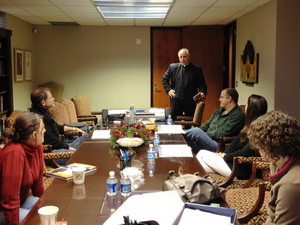|
By Fr. Dean Hountalas Financial sights are projecting, we are moving from “a golden age” of investments and economic growth (1982-2007) to a “grey age”. From nominal 12.8% returns to 2.8% returns. The next ten years, we may be going through 3 more recessions. With the baby boomers aging it may take to 2027 before returns get to golden age levels.  In the last 75 years the winning formula was more energy, more output, more people, more credit, and more promises as empty as they may be now. More doesn’t work any longer. For us, consumerism has consumed us. We are now living in a vicious cycle and lifestyle of living in debt to afford “stuff.” In Proverbs 22:7, it says “the borrower is slave to the lender.” We as a society, which includes our faithful, are not only slaves but are drowning in debt. As you drown, you are suffocated. In the Wisdom of Proverbs and within the Scripture, we hear many references on the subject of money. Today, I am heralding to tell you that the Lord through His Word tells us His ways about handling money. There are principles involved. This presentation supplements the concise Stewardship presentation that was recently given at the Metropolis Clergy Laity in September. I am surfacing the practical aspect that seems too frequently the subject of our focus. However, in the general scheme of things, it is actually how to manage the resources and talents we have been gifted by God Himself. Metropolitan Nicholas visiting the FPU Class SessionYup, you all know everything is God’s and that does include money. You all know the word myth in our mythology background. A myth in today’s society is a lie spread by a culture that is accepted as fact. However, it is still a LIE. Included is this myth is that I earn the money, the money is mine, it is personal to me, and no one tells me what to do with it. Guess what, marketing does! We have fallen prey to the marketing’s deceptions on what to do and how to spend “my money”. Yes, throngs of people are captive to this ploy of life and culture. The lender is the banking system that gives out credit cards like a stranger gives candy to children. Credit cards are personal loan cards. These cards and its services support our lifestyle and addiction of consumption. Out of control? P.T. Barnum, circus icon, once said, “money is an excellent slave or a horrible master.” From empowerment, we have grown into a culture of entitlement. Our biggest obstacle as a society and even our local church is DENIAL. We have existed decades here in America with a T.J. Maxx mentality: we want the max for the minimum. We have taught our children that someone else will provide for “their” church. The mentality of mine has permeated as a way of life. That mentality of “if the church owes; then people will give”. What people? Our great minimalistic mentality has created raffles, festivals, auctions, banquet facilities, and gaming events to fund what is sacred. We wouldn’t do this to our loved ones, why do we violate our mother church? We as an institution have accepted this myth of doing things that we have developed processing deficiencies, difficulty, and even spiritual stubbornness to envision real Stewardship. Just as slaves born into slavery can’t envision freedom, we have difficulty envisioning Stewardship as our way of life as Orthodox Christians. Fr. Dean Hountalas teaching the FPU ClassIgnorance is not a lack of intelligence, it is a lack of knowledge. In this Metropolis His Eminence has taken an initiative, as one being a practicing icon of Christ’s message of “where your treasure is, there will your heart be also.” (Matt. 6:21). A Metropolis that’s been the hardest hit by the economic crisis, the Metropolitan has taken proactive action and identified the successful and proven personal financial process to help households and their families with disciplined money management. The publication Christianity Today, August 2011, validates the success of this process over the past 10 years in mainline Christianity. It is called Financial Peace University. There are 13 sessions that teach this proven process and has changed behavior about handling money. It has changed households, relationships, lifestyles, and even attitudes on principles that God has given us. We are conducting Financial Peace Sessions over 13 weeks (November 5-January 28) to begin a new journey of ministry to our faithful; to give hope and a better plan to help them to become real stewards of God. About the Financial Peace University Program at the Metropolis of Detroit A biblically based curriculum that teaches people how to handle money God’s way God has given us more than 800 Scriptures about money What It's About: Financial Peace University teaches you how to make the right decisions with your money and empowers you with the practical skills and confidence needed to achieve your financial goals and experience true financial peace! Over one million families have already benefited from this life-changing program that: • Teaches financial responsibility with easy Baby Steps • Helps eliminate debt using the Debt Snowball • Offers accountability and continued support with lifetime membership • Trains participants to spend every dollar on paper with the zero-based budget planner • Empowers people struggling with financial hardships by establishing a plan to take control of their money. The possibilities are limitless when the people of God use their resources in a godly manner Financial Peace University (FPU) is a 13-week video curriculum taught by financial expert Dave Ramsey, that incorporates small-group discussions to encourage accountability and discipleship. More than one million families have already attended FPU and changed their lives forever! Unit 1: Saving and Investing Chapter 1: Savings • Three basic reasons to save money: emergency fund, purchases, building wealth • Discipline, patience and goal setting as related to personal and financial matters Chapter 2: Understanding Investments • Compound and simple interest • Liquidity, diversification, risk-return ratio • Certificates of deposit, money markets, single stocks, bonds, mutual funds, rental real estate, annuities, commodities and futures Chapter 3: Wealth Building and College Savings • Benefits of long- and short-term investing using tax-favored plans • IRAs, Roth IRAs, SEPP, 401(k), 403(b) and 457 retirement plans • Educational Savings Accounts, 529 Plans, UTMA and UGMA Unit 2: Credit and Debt Chapter 4: Dangers of Debt • Myths associated with debt, including credit cards, payday lending, rent-to-own, debt consolidation, leasing automobiles and co-signing loans • The history of debt and how to avoid it • The aggressive marketing of debt, particularly to young people Chapter 5: Consumer Awareness • The power of marketing on buying decisions, including "0% APR" and "no interest" deals • Ways companies compete for our money, including product positioning, advertising, brand recognition and personal selling Chapter 6: Credit Bureaus and Collection Practices • How to read a credit report and correct inaccuracies • Uncover the myth about building your credit score • Systematic plan to deal with creditors and avoid bankruptcy • Fair Debt Collection Practices Act explained Unit 3: Financial Responsibility and Money Management Chapter 7: Budgeting 101 • In-depth explanation of balancing a checkbook • Step-by-step methods of creating and living on a written budget Chapter 8: Bargain Shopping • Benefits of negotiating and basic rules to follow for success • Negotiating techniques Chapter 9: Relating with Money • Explore how men and women view money differently • Identify personality traits regarding money Unit 4: Insurance/Risk Management and Income/Careers Chapter 10: Careers and Employment Taxes • Discuss career choices that fit personality styles and occupational desires • Learn successful job-search strategies such as cover letters, resumes and interview techniques • Understand payroll taxes and terms such as FICA, state, federal and Social Security withholdings • Examine tax revenue sources for federal, state and local governments Chapter 11: Ins and Outs of Insurance • Describe various insurance coverage including renter's, homeowner's, automobile, health, disability, long-term care, identity theft and life insurance • Understand insurance terminology such as deductible, stop loss, elimination period, replacement coverage, liability and out-of-pocket maximum • Distinguish between term life, cash value and whole life insurance Chapter 12: Real Estate and Mortgages • Knowledge of the buying, selling and renting process • Ability to weigh the various costs associated with home ownership and renting • Describe types of mortgages including ARM, balloon, conventional, VA, reverse, FHA and owner financing Bonus Chapter Chapter 13: The Power of Giving In The Power of Giving—an optional supplemental chapter—Dave teaches students why giving is an important aspect of a healthy lifestyle. What are the benefits? Most financial programs are boring, with confusing information and monotonous instructors. Financial Peace University (FPU) is different. FPU is highly entertaining for everyone, with a unique combination of humor, informative financial advice and biblical messages. Changed family trees The decisions your church makes today will affect generations to come. Are you ready to help them change their lives? A tremendous outreach tool FPU brings new people to your church and introduces them to the Kingdom of God. Increased giving Church members will begin to eliminate costly debt payments and give like never before! Stronger marriages Couples learn how to communicate about budgeting, spending, and saving and get on the same page about their money. A solid financial foundation for singles Small groups form relationships and help singles find accountability partners to help them stay focused on their personal financial goals. For more information about the Financial Peace University Program, click here. |
Topics
All
|

 RSS Feed
RSS Feed
